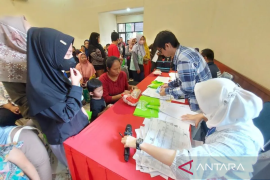We need to prepare human resources, who are able to compete in all fieldsJakarta (ANTARA) - The Indonesian government succeeded in reducing the total birth rate to 2.14 in an effort to control population growth and create quality human resources.
The National Population and Family Planning Agency (BKKBN) stated that the total birth rate, which shows the average number of children born to a woman during her fertile age (15-49 years), has fallen, from 5.6 in 1971 to 2.14 in 2022.
"The average is 2.1, which is quite low," BKKBN Head Hasto Wardoyo stated in a statement obtained here on Thursday.
Wardoyo remarked that the total birth rate of 2.14 could be one of the capitals to realize a Golden Indonesia 2045.
"Golden Indonesia, according to the president's direction, is that we can reach the top four or five places in the world economy if we have sufficient manpower," he remarked.
In an effort to realize a Golden Indonesia 2045, the decline in the total birth rate must be balanced with steps to improve the quality of human resources (HR).
"We need to prepare human resources, who are able to compete in all fields," he stated.
At a meeting to review the national family development, population and family planning programs (Bangga Kencana) and the acceleration of stunting reduction on Wednesday (Aug 30), Wardoyo emphasized the need to accelerate the achievement of the program's targets and reduce stunting in an effort to create quality human resources.
Meanwhile, Head of the Financial and Development Supervisory Agency (BPKP) Muhammad Yusuf Ateh highlighted the importance of strengthening the initial planning of the budget to optimize program implementation.
"A small budget is not an excuse for not achieving targets. (It is) because we already know that the budget is small, while the target is large, (so) we need to strengthen the plan from the start," he stated.
"First of all, the planning must be clear. Hence, we need to utilize this little money to achieve big results. That is the challenge," he remarked.
The 2020-2024 National Medium-Term Development Plan (RPJMN) for the Population and Family Planning Sector in the 2020-2024 BKKBN Strategic Plan includes six targets of the population and family planning development program that include increasing the use of modern contraception.
Other targets are a decrease in the total birth rate, a decrease in the unmet need for Family Planning (KB) programs, a decrease in the Age Specific Fertility Rate (ASFR) aged 15-19 years, an increase in the family development index, and an increase in the median age at first marriage for women.
Related news: Unmet need for family planning in Bali still high:BKKBN
Related news: Stunting intervention to focus on regions with high population
Related news: National birth control efforts are already on track: BKKBN
Translator: Lintang Budiyanti Prameswari, Katriana
Editor: Sri Haryati
Copyright © ANTARA 2023












